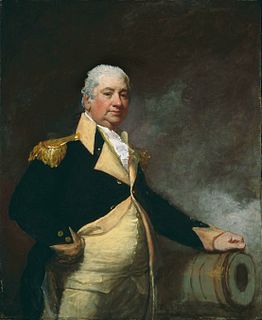A Quote by James Madison
Of all the objections which have been framed against the federal Constitution, this is perhaps the most extraordinary. Whilst the objection itself is levelled against a pretended oligarchy, the principle of it strikes at the very root of republican government.
Related Quotes
Constitutions are violated, and it would be absurd to expect the federal government to enforce the Constitution against itself. If the very federal judges the Constitution was partly intended to restrain were the ones exclusively charged with enforcing it, then "America possesses only the effigy of a Constitution." The states, the very constituents of the Union, had to do the enforcing.
People try to persuade us that the objections against Christianity spring from doubt. That is a complete misunderstanding. The objections against Christianity spring from insubordination, the dislike of obedience, rebellion against all authority. As a result, people have hitherto been beating the air in their struggle against objections, because they have fought intellectually with doubt instead of fighting morally with rebellion.
One of the reasons I believe the spiritual door was opened for an attack against the United States of America is that the policy of our Government has been to ask the Israelis, and demand it with pressure, not to retaliate in a significant way against the terrorist strikes that have been launched against them.
If these precedents are to stand unimpeached, and to provide sanctions for the continued conduct of America affairs-the Constitution may be nullified by the President and officers who have taken the oath and are under moral obligation to uphold it....they may substitute personal and arbitrary government-the first principle of the totalitarian system against which it has been alleged that World War II was waged-while giving lip service to the principle of constitutional government.
I am committed against every thing which in my judgment, may weaken, endanger, or destroy (the Constitution) ... and especially against all extension of Executive power; and I am committed against any attempt to rule the free people of this country by the power and the patronage of the Government itself.
One of the basic philosophical tenets of conservatism - which says that the more power devolves from the federal government to the states, the greater individual freedom grows - is just flatly contradicted by crucial junctures in the country's life, most conspicuously in the 1860s and 1960s, when it's been the federal government that's interceded against the states to secure individual freedom.
It may be considered as an objection inherent in the principle, that as every appeal to the people would carry an implication of some defect in the government, frequent appeals would in great measure deprive the government of that veneration which time bestows on every thing, and without which perhaps the wisest and freest governments would not possess the requisite stability . . . a constitutional road to the decision of the people ought to be marked out and kept open, for certain great and extraordinary occasions
It [the Constitution] didn't break free from the essential constraints that were placed by the founding fathers in the Constitution, at least as it's been interpreted, and the Warren court interpreted it in the same way that generally the Constitution is a charter of negative liberties. It says what the states can't do to you, it says what the federal government can't do to you, but it doesn't say what the federal government or the state government must do on your behalf. And that hasn't shifted.
But did the Founding Fathers ever intend for the federal government to involve itself in education, health care or retirement benefits? The answer, quite clearly, is no. The Constitution, in Article I, Section 8 - which contains the general welfare clause - seeks to restrain federal government, not expand it.
































